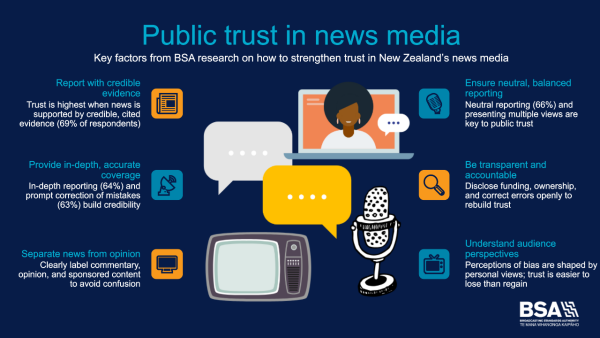Trust in News Media
Public trust in media is linked to social cohesion and trust in public institutions more generally. It is important in a functioning democracy that people have access to reliable and accurate news media – and that they have trust in the information they receive through media channels.
Trust in media has fallen in recent years. While there are some signs this is stabilising, and New Zealand media are taking active steps to improve trust levels, it is important to understand more about the drivers for trust and distrust.
This research seeks to better understand the public’s expectations around news content and what factors are most likely to support increased trust in New Zealand’s news media.
Click on image to enlarge
The survey indicates high engagement and interest in news media among the public and a tendency for greater trust in, and use of, New Zealand news providers (including those funded/owned by government).
It offers useful guidance on factors the media can address in combating issues of trust. The leading factors are cited relatively consistently across demographics and in relation to different types of news platforms.
Bias (or freedom from bias) comes through as a strong influence on trust – identified in the top factors causing trust, distrust, and loss of trust. However, the report also highlights how perceptions of bias are influenced by consumers’ own personal views – the concept of what is ‘trustworthy’ naturally depends a lot on personal perspectives.
When asked to select from a list, the top four factors participants said influenced trust the most were: Reporting supported by credible, cited evidence (69%); Neutral (unbiased) reporting (66%); In-depth reporting allowing a good understanding of issues (64%); and Mistakes acknowledged and corrected promptly (63%).
Distrust in media is driven by many of the same factors that promote trust, only in reverse.
While the findings suggest some prefer news media to focus on the facts, others want interest and entertainment and may continue to engage with an ‘entertaining’ news provider even if considered untrustworthy.
The report will help inform the media’s efforts to reverse the loss of trust in recent years. The BSA will use it to inform future decisions and consider the findings in the next review of the Code of Broadcasting Standards, to ensure we capture any adjustments needed to better reflect public expectations around news reporting.
You can read the full findings and a media release highlighting key outtakes here:
Full Report: Trust in news media
Media Release: New BSA research sheds light on the factors which ensure public trust in media
